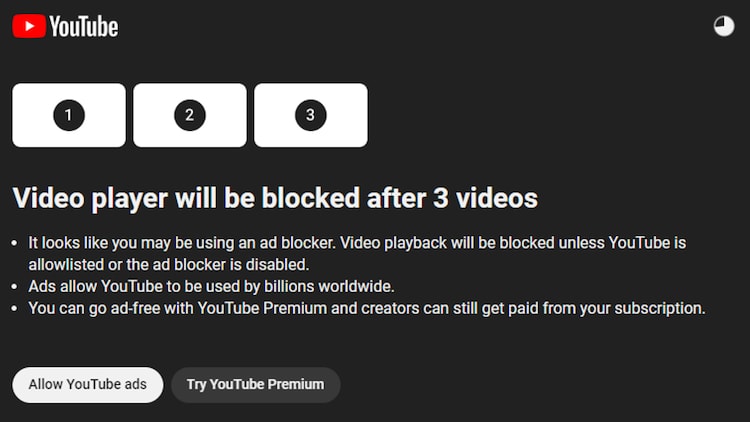
YouTube is cracking down on the use of ad blockers, and some users are feeling the impact. Reports of users receiving notifications urging them to disable ad-blocking software have flooded Twitter. This new policy is causing ripples among YouTube’s audience as the platform becomes more proactive in enforcing its stance against ad-blocker usage.
YouTube’s response to ad-blockers includes sending notifications to users who employ these tools. These messages strongly encourage users to disable their ad blockers if they wish to continue watching videos on the platform. After repeated warnings, YouTube is implementing restrictions that limit users to watching only three videos before revoking their access. It’s important to clarify that this isn’t a permanent ban. Users who comply with YouTube’s request to disable ad blockers or opt for YouTube Premium will regain full access to the platform’s content. However, users have reported ongoing issues even after disabling their ad-blockers, with YouTube persistently displaying ad-blocker removal banners.

This crackdown is not a sudden development; YouTube had forewarned about these actions a few months ago. The platform informed The Verge that it would begin blocking users who violated their ad policies. YouTube reiterated its approach of sending multiple notifications to users, encouraging them to cease the use of ad-blockers or consider a subscription to YouTube Premium before their viewing capabilities are restricted. A YouTube spokesperson stated in an email, “We take disabling playback very seriously, and will only disable playback if viewers ignore repeated requests to allow ads on YouTube. In cases when viewers feel they have been falsely flagged as using an ad blocker, they can share this feedback by clicking on the link in the prompt.“
For users seeking an ad-free experience on YouTube, they have two options. They can either disable their ad-blocker extensions in their browsers or opt for a YouTube Premium subscription. The latter comes with a monthly fee, starting at Rs 129 for individuals and Rs 179 for a family subscription that can include up to five members. This move by YouTube underscores the ongoing tug-of-war between content creators and viewers who employ ad blockers to skip ads. For content creators, advertisements are a crucial source of revenue, and YouTube’s new approach aims to safeguard their income from being undermined by users who attempt to bypass advertising. While this demonstrates YouTube’s dedication to supporting content creators and the ad ecosystem, it also ignites debates about user privacy and choice in an age where online advertising is omnipresent.